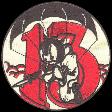
Don A Banta

Don A Banta
One very thank you to Don Banta to have agreed to answer my very numerous questions and in French! For his kindness and its availability!
|
IN MEMORIAM |
|
It's with great sadness that I must inform you of the death of Don Banta. He passed away on March 30, 2015. We should never forget that this man has done for us; Rest in Peace Don thank you so much for our friendship. I'll miss you very much. God Bless you! |
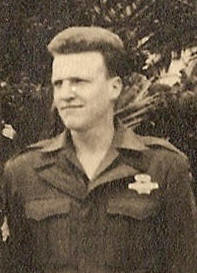 <= Don Banta in 40's years
<= Don Banta in 40's years
And now =>
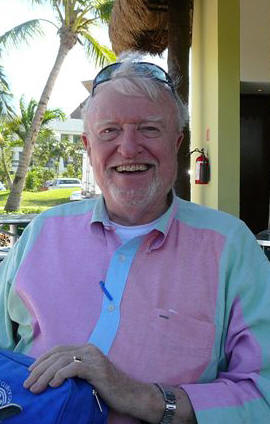
Don Banta was born on the 10th of March 1926 in Chicago, Illinois. His dad, George Banta was an engineer but used to work as a sales representant in industrial equipment. His mom, Grace Banta was born Donnelly and was a registered nurse.
The Banta family only had a single child.
The Bantas suffered from the 1929 Great Depression as many other families at that time but as the father worked there was always food to eat.
« We used to live with my grand father who was a retired farmer ».
Don Banta had a very happy childhood. He studied in a little countryside school with only one classroom then left afterwards for a college with militarian courses and with more than 3000 students over 4 years.
In May 1943, he got his degree as a junior ROTC. After 3 months studying at the Nothwestern Uni, Don Banta enlisted in a special army program to become a reserve officer (Army Specialized Training Program). He was sent to the Wisconsin Uni.
"But after 7 months, the Army needed replacements for the infantry troops so they cancelled the program and sent me to Camp Wolters in Texas to get an infantry training."
Thanks to his ROTC training, Don Banta was appreciated. His major recommended him to get the OCS training. But Don refused the proposal.
"I did not want to be a lieutenant in an infantry division and I’d rather sign up to the paras to get the red boots and some jump wages but also to be among volunteers who had a high motivation and not to be among recruits with no motivation at all."
Don Banta joined Fort Benning Jumpschool. After an important physical preparation and a rigourous training, Don Banta did his 5 jumps which would give him the title of parachutist. Then and there he would be a Private First Class and so until the end of the war.
"The 1st jump was exciting and thrilling once you got the nose out of the plane. The most difficult at the jumpschool were the physical exercices lead by sadistic non commissioned officers. I got my patent in August 1944."
Then Don Banta was sent to England with the new recruits. The journey took place aboard an Italian ship.
"I can not remember the name of the Italian ship but I can remember Italian sailors drinking red wine and eating while we were all sea sick."
Don Banta was part of the replacements who had to join the 82nd and the 101st regiment which had jumped over Holland. But as they did not lose that much soldiers he was integrated to the 513th PIR to the GQ Company located in Camp Barton Stacey England.
"When I joined the 513th I did not know the people but there was a little group of new recruits like me which was chosen to be part of the wire section and we immediately decided to become a band of brothers. There was Sergent Rudy the oldest in the group who was a tall boxer Polish boy coming from the south of Chicago. And there was Bobbie a funny and carefree guy. Then came Hoffie, a handsome German boy and Kloot the Dutch guy from Pella a little then colonized by the Dutches town in the midwest. And there was me, I was the youngest. I was barely 18 years old. We were so naive. Nobody had an experienc e in combats so the 17th Division Airborne."
Then on the 16th of December, the German troops launched a sudden offensive through the Belgian Ardennes. This campaign would be later known in the USA as the Battle of the Bulge. From the 23rd to the 25th of December, people from the 17th Airborne were sent to Belgium via France aboard C47 planes.
"We took off despite the awful weather. We flew over the Manche. The weather was so crap everybody on the plane even the nurse were absolutely sea sick. I was the only one not to be sick. That was the first time my guardian angel would be there for me. He still follows me then."
Don Banta can not remember that much about the Ardennes campaign. Not that much too about places where he stayed over or went through.
"What I can remember though were the cold, the snow and the ice. My toes, my forehead and my fingers were frozen. Especially my toes because our shoes they gave us worthed nothing and the hot waterproof shoepacks they gave were only given away in February !"
"But I do not hesitate to say I was scared ! I threw up in our barn where we used to sleep when I saw the frozen body of a killed soldier, when I saw the destructions and when I found out about the loss of our people in our company"
"Our mission as wiremen was to build up and maintain the contact between the different companies of the regiment. So I did not need to use my gun during the battle of the Ardennes. Our risk was to be killed under the shell mortars while there could has been a bombing. But thanks to my guardian angel, I’ve never been hit."
After Flamiege was freed at the beginning of January 1945, the 513th carried on through towards the Siegfried line along the Our River. Once we got to this river the regiment stopped its way.
"If you watch BOB, you can watch 2 episodes about what we did in Begium. There is one which took place in the woods nearby Foy and there is one about the crossing of a river for a raid to get some prisonners. We were located on the left handside of the 506th in Foy area and someone told me the reconnaissance team of my GQ company (my buddy Devaney was one of them) did a similar raid to the other side of the river to get some German prisonners."
On the 11th of February, the regiment but also the 17th were back to France nearby Châlon sur Marne to get ready for the Operation Varsity. The men were sleeping underneath tents. The 513th PIR had been chosen to jump over from new planes called C46 commando and one thing to notice were the double doors on each side of the plane.
"We did a training jump aboard on those planes. While we jumped over I remember I had a laugh with my buddy Weiss. Few weeks later he was killed over the Rhine. I can remember right before the jump on the airplane field there was the famous war photographer called Robert Capa. He took loads of photos of my company and he jumped over with my company still taking loads of photos after the jump. Numerous photos were published in Life Magazine but there was none of me."
Don Banta’s jump did not happen very well. The C46 where he was onboard was shot by the Flak right after it came in to the enemy lines. But luckily the men jumped over before the plane crashed. His friend, the Sergent Rudy Devich who was the last man to jump over can remember the plane go crashing.
"I did not know what happened to the crew but I can clearly remember the chief of the crew standing in the cabin with an anti air helmet."
As General Miley told, the jump happened at 400 feet high.
"I can remember the clash when we hit the ground, in a farm field in the middle of British Horsa gliders trying to land down."
Once on the ground, he tried to find out about his equipment and the wires for the communications.
"At that moment, we were caught in a light fire exchange and we thought it came from a nearby farm. We started to fire and Rudy was zigzaging to the barn to throw a grenade. As we jumped far over from our DZ, we had to find our platoon. We were very lucky because nobody had been killed."
After the combats which took place nearby Munster, the 513th joigned the British Tanks of the Guard Armored where men were all over tanks to cross Germany.
"It was like a huge party because the Brits were stopping on the side of the road at 11 am and at 2 pm to light a fire and to prepare some tea. We were thinking this was quite funny."
Then a little bit later, Don’s company caught one of Herman Goering’s barracks.
"There was a huge beer room with taps of full of beer which flowed. It has been very difficult to send us away ! There were great souvenirs, badges and other militaria stuff from the Luftwaffe."
As the war was ending, Don’s company got the surrender of thousands of Germans soldiers.
"We were like 4 or 5 men walking with a whole battalion of German prisonners to the prisonner point. I was not at ease."
For few weeks, he and his wiremen were sent to Sterkrade in the Rurh area where they had to settle a communication system.
"We stayed over in a house where a German woman and her 2 daughters lived, it was very nice. We fed them. We were the only soldiers in town. Sometimes they asked us to protect the women and the kids and also the nuns against the forced and moved workers who used to live there during the Occupation in a nearby coal mine. Those workers wanted to get a revenge. We could understand but they could not get a revenge over the women and the children."
Later on, the 17th Airborne was sent back to France. The soldiers who got enough points left the 17th to go back to the USA and to go back to the civilian life. Don Banta was transferred to the 13th Airborne.
"But before being transferred I got a ten days permission in Nice. We took on a C47 plane and we had a room at the Ruhl Hotel over the beach. No officers on sight ! Good wine ! And we had some really good time !"
But strangely back to the 13th Airborne Div. he was assigned to the 458th PFAB.
"It was quite unbelievable because I was a man from the infantry. I did not know nothing about a 75mm mortar gun and they forced me to cannon which is an artillery exercice. And the worse was they were all new recruits, they have never been to a single combat or fight and some bloody stealers took some stuff from my shirt inside my tent ! what a shame ! My friends were transferred somewhere else. I have not seen them anymore. I was missing them really."
The 13th Airborne was told it had to go fighting in the Pacific. Don’s new regiment embarked on ships direction to the USA first still on sea but the soldiers found out President Truman decided to drop off 2 atomic bombs over Japan and the war was over. The 13th Airborne disembarked on October 1945 in the USA. Don Banta was back to the civilian life on December 1945.
"I had enough points to be « free » when I arrived in the USA. My guardian angel was still next to me. I was at home for Christmas and my parents were so happy to see me ! My mom cooked all my fave meals : beefsteaks and rasperry shortcakes."
Don Banta went back to studies. He studied first at the Northwestern University and then at the Northwestern University School of Law where he got his degree as a lawyer in 1950.
"I became a lawyer and so I did work until 2001 when I got retired. I got specialized about the economy laws which defend the boss or answer the questions about links between workers and trade unions."
Don got married to Maxine (but called Mickey) on the 31st of March 1951. They have 4 children and 6 grand children. Everybody lives around him in Chicago.
"Sometimes we are looking after the kids."
Concerning the stuff he got in the army, his Corcoran boots were sealed in the bronze by his mum which he gave to his son. He gave his jump jacket to one of his daughter and his Ike jacket to one of his grandchild fond of WWII. That were the only things he kept from the army.
When he was at war, he came back with a piece of his parachut which was cut over the Rhine on the battlefield on the 24th of March and he also came back with some German souvenirs (like a Waffen SS skull head, an iron helmet, some Luftwaffe badges and a baionet).
"My wife uses the stalhelmet as a flowerpot. It is damaged. What a pity."
Don is also a perpetual member of the Veterans of the 17th Airborne association but he only attended one meeting as he is not an active member.
"My life is still nice even if I got some illnesses but none of them were that serious."
"I do sports twice a week but it is not like back in 1944 when I could run 3 or 4 miles before breakfast."
Don likes to read, to write and to listen to his French lessons.
"Those oral lessons are called Champs Elysees that’s why I speak like a Spanish cow."
(That is why I did mostly this interview in French with Don)
"Souvenirs fade away. Scary moments are not that vivid anymore while the moments of the jumps over the Rhine are so clear in my mind. I will always remember them."
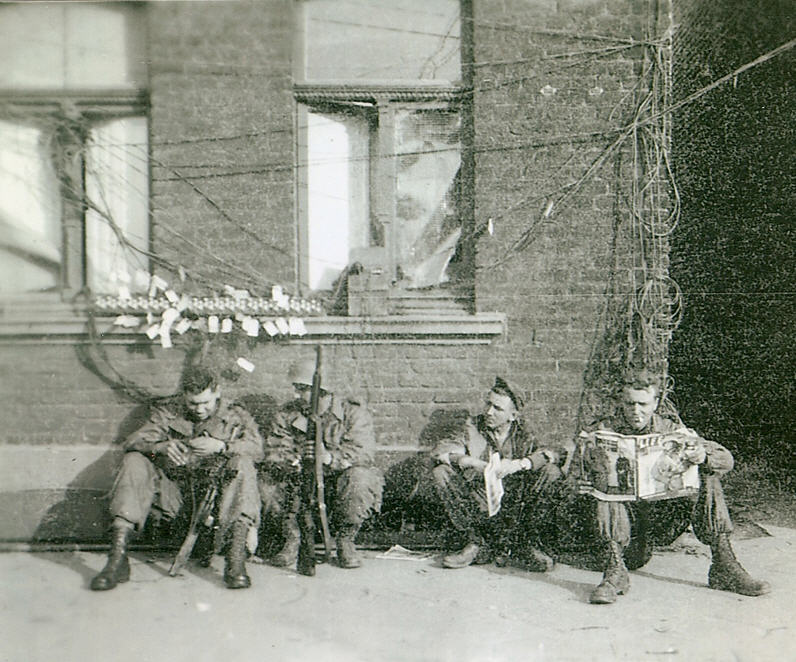
Don A Banta (the first one to the right with the magazine LIFE) with the men of his "section of thread" in the phone center of Sterkrade, Germany during the occupation. May, 1945
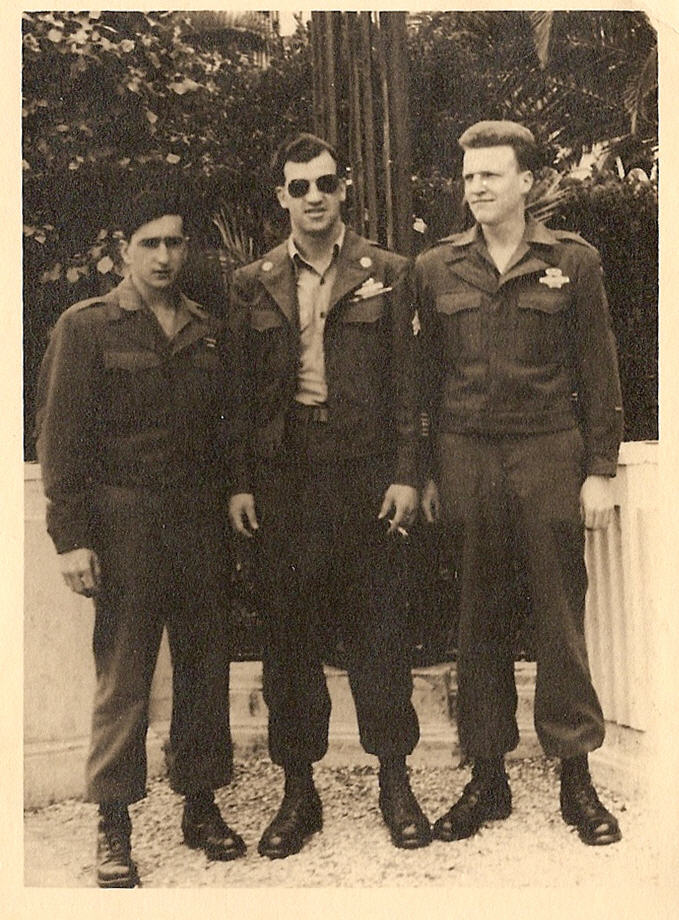
Don Banta to the right, next
to him, the Sergeant Rudy.
Photo taken during a permission in Nice, July, 1945